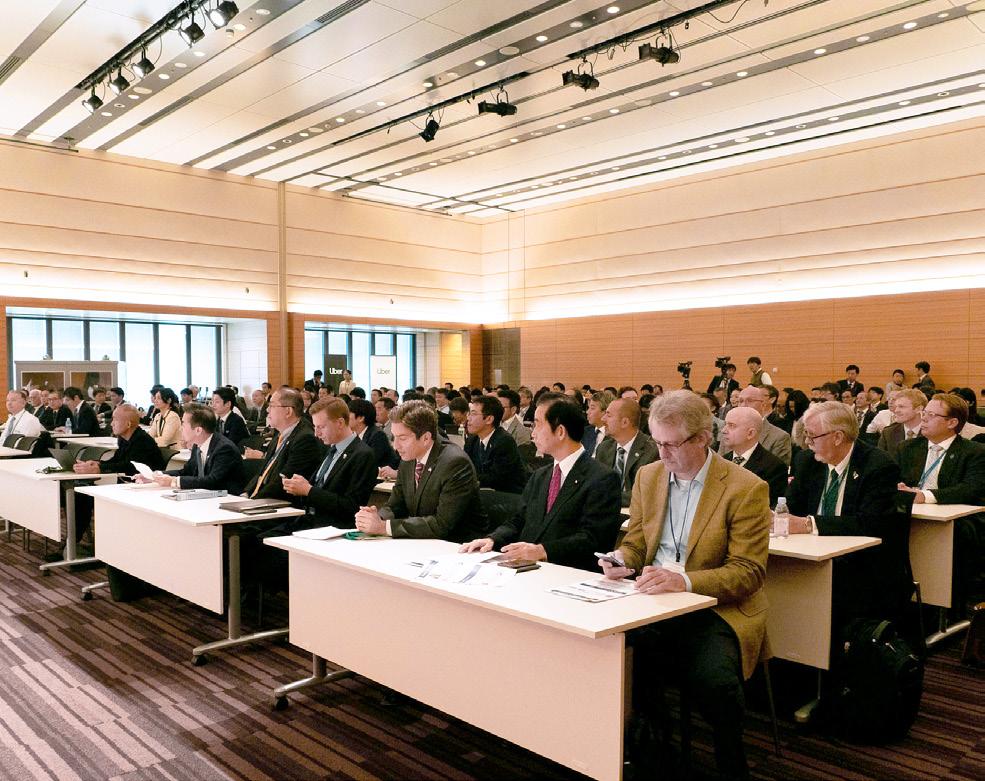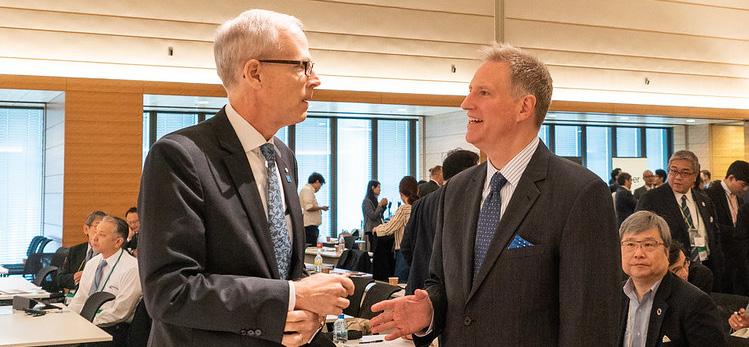
4 minute read
ADVOCACY
Tourism-driven Growth US and Japan governments, ACCJ focus on inbound potential
By Jay Biggs
Advertisement
In conjunction with the US & Foreign Commercial Service (US&FCS), the American Chamber of Commerce in Japan (ACCJ) built on its strategic advocacy focus of tourism, sports, and hospitality through two very successful Hospitality Management Summits last October. These events focused on management-level talent in Japan and the educational infrastructure needed to ensure that talent is available and ready to support the continued growth of the hospitality industry. The first was held at Kansai Gaidai University in Osaka on October 28 and the second at the House of Representatives International Conference Room in Tokyo on October 30. More than 330 people attended the two events at which US and Japanese universities facilitated 74 one-on-one consultative meetings.
CHAMBER STRENGTH Utilizing the chamber’s connections in the hospitality sector and the US&FCS’s contacts in education and government, the team put together a dynamic mixture of policy discussions among members of the Diet, senior tourism officials, and executives from the hospitality industry.
The short-term objectives were to showcase the hospitality management programs offered by US universities and to encourage Japanese universities to send more students to the United States to engage in these programs. The long-term goal
is to promote industry best practices—such as internships and advisory boards—to Japanese universities and tourism officials. This will help Japan meet its national tourism promotion targets and facilitate economic growth.
The ACCJ and its members were instrumental in making the events happen. The idea was developed by ACCJ Tourism, Sports, and Hospitality Advocacy Pillar Chair Stephen Zurcher, who served as ACCJ-Kansai Vice President from 2016 to 2019, together with ACCJ-Kansai External Affairs Committee Chair Steve Iwamura and Lee Brayman of the US Consulate OsakaKobe’s Commercial Section. Zurcher arranged to host the Osaka summit on the campus of Kansai Gaidai University and also served as moderator. Mark Davidson, co-chair of the ACCJ Education Committee, served as master of ceremonies for the Tokyo event.
Because the ACCJ has made tourism, sports, and hospitality an advocacy priority, chamber resources—including staff at the Kansai and Tokyo offices—were made available to ensure these events ran as smoothly as possible.
DOUBLING TOURISM During the summits, various speakers from academia and industry defined the scale of the growing human resources crisis for the hospitality industry in Japan. In addition to the stated
national goal of nearly doubling the number of annual inbound tourists from 20 to 40 million by this year, Abenomics—the collective terms for the economic policies of Japanese Prime Minister Shinzo Abe—calls for all forms of tourism to contribute 10 percent of the total gross domestic product. That’s up from the current six percent. By 2030, Japan will need to fill 60,000 middle- and upper-management positions in this sector.
Japanese tourism officials, including Diet members, are keenly aware of the need to better prepare Japanese students to meet this demand. One Diet member noted at both events: “Tourism studies provided by Japanese universities has been completely out of touch with the needs of the industry. We have no time to continue this situation and must develop resources which can lead the hospitality industry. To achieve the goal, we need to introduce hospitality management education that is well developed and has a proven track record.”
ESSENTIAL COLLABORATION The second portion of the summits comprised roundtables featuring ACCJ members from hotels and other sectors of the hospitality industry. These experts outlined the difficulty of finding the necessary human resources talent needed to meet the nation’s tourism goals.
While US hospitality management programs are heavily focused on business, Japanese universities tend to treat hospitality as tourism studies. And these programs tend to be short, unlike those in the United States which require six months to a full year of internship experience. In terms of connections, a lack of strong working relationships within the industry was identified as a problem for Japanese universities.
As numerous ACCJ members pointed out, industry advisory boards in the United States play a critical role in shaping curricula, providing pipelines for internships, and giving professors opportunities to refresh their understanding of the industry. MATCHMAKING Having outlined the need for more graduates trained in hospitality management, deans from five of the top programs in the United States introduced their curriculums. The summits concluded with two hours of matchmaking meetings between US and Japanese universities during which they discussed the expansion of student and faculty exchanges. Participating US universities included:
The University of Central Florida Michigan State University The University of Nevada, Las Vegas The College of the Desert (California) The University of Wisconsin
FOLLOW-UP Enthusiasm ran high throughout the summits, and participants expressed an interest in organizing a follow-up program in 2020. After the Tokyo Summit, participants met with Diet members from the Liberal Democratic Party of Japan and officials from the Japan Tourism Agency, all of whom suggested focusing on destination management organizations as a way to spread the impact of Japan’s expanding tourism beyond Tokyo and Kyoto. Additionally, the US&FCS Osaka is working on a followup program to see if Japanese hotels would be interested in using interns from some of the US universities that participated. The Hospitality Management Summits were the first step in what will hopefully be a long-term project involving ACCJ members, and we look forward to your ongoing input. n
Jay Biggs is principal commercial officer at the US Consulate General Osaka-Kobe






